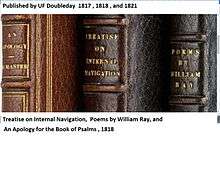Ulysses F. Doubleday
| Ulysses F. Doubleday | |
|---|---|
| Member of the U.S. House of Representatives from New York's 24th district | |
|
In office March 4, 1835 – March 3, 1837 | |
| Preceded by | Rowland Day |
| Succeeded by | William H. Noble |
|
In office March 4, 1831 – March 3, 1833 | |
| Preceded by | Gershom Powers |
| Succeeded by | Rowland Day |
| Personal details | |
| Born |
December 15, 1792 Otsego County, New York |
| Died |
March 11, 1866 (aged 73) Bloomington, Illinois |
| Resting place | Old City Cemetery, Bloomington, Illinois |
| Political party | Jacksonian |
| Spouse(s) | Hester Donnelly |
| Children | 4 |
| Military service | |
| Allegiance |
|
| Service/branch |
|
| Battles/wars | War of 1812 |
Ulysses Freeman Doubleday (December 15, 1792 – March 11, 1866) was a U.S. Representative from New York. He was also a newspaper publisher, a book publisher, a veteran of the War of 1812, a merchant, and farmer.
Biography
Born in Otsego County, New York, Doubleday received a limited formal schooling. While living in Cooperstown he was apprenticed to the village printer at a very young age. Apprentices were legally bound to work for many years with little or no rights but with a chance to learn a useful trade. Ulysses was near the last of 27 Doubleday children. His father Abner Doubleday was a farmer and Revolutionary War soldier. His mother Mercy Freeman was a preacher's daughter. He learned the art of printing and worked as a printer in Cooperstown, Utica, and Albany, New York. He served at Sackets Harbor in the War of 1812. He established the Saratoga Courier at Ballston Spa. He was a book publisher under the name UF Doubleday printing leather bound books starting in 1817. He published Samuel Young's Treatise on Internal Navigation, 1817 (with parts written by Albert Galatin), Gilbert McMaster's An Apology for the Book of Psalms, 1818 and William Ray's Poems on Various Subjects, 1821. He moved to Auburn, New York, where he published and edited the Cayuga Patriot 1819–1839. He ran a book store in Auburn called Doubleday's. The town of Auburn benefited from the Erie Canal and became the 3rd largest city in New York State.
Doubleday was elected as a Jacksonian to the Twenty-second Congress (March 4, 1831 – March 3, 1833). He was appointed inspector and warden of Auburn Prison in 1834. In May 1834 he helped charter the Auburn and Syracuse Railroad.
Doubleday was elected to the Twenty-fourth Congress (March 4, 1835 – March 3, 1837). He engaged in agricultural pursuits in Scipio, New York from 1837 to 1846. He moved to New York City and engaged in mercantile pursuits 1846–1860. He died on March 11, 1866, in Bloomington, Illinois. He was interred in the Bloomington Township Old City Cemetery, Bloomington, Illinois.
He married Hester Donnelly and they were parents of Thomas D. Doubleday, Major General Abner Doubleday, Brevet Brigadier General Ulysses Doubleday and Jane Ann Doubleday (March 5, 1830 – June 12, 1843).

References
- United States Congress. "Ulysses F. Doubleday (id: D000444)". Biographical Directory of the United States Congress.
| U.S. House of Representatives | ||
|---|---|---|
| Preceded by Gershom Powers |
Member of the U.S. House of Representatives from New York's 24th congressional district March 4, 1831 – March 3, 1833 |
Succeeded by Rowland Day |
| Preceded by Rowland Day |
Member of the U.S. House of Representatives from New York's 24th congressional district March 4, 1835 – March 3, 1837 |
Succeeded by William H. Noble |
External links
![]()